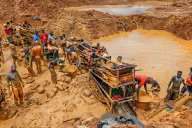Her Ladyship Justice Mariam Gyasi Jawhari, a Justice of the Court of Appeal, has cautioned that Ghana’s food security and public health are in grave danger due to the devastating impact of illegal mining (galamsey) on the environment.
Speaking as Guest of Honour at the 43rd Annual National Ijtema (Convention) of the Ahmadiyya Muslim Women’s Association of Ghana (Lajna Ima’illah) in Sunyani, Justice Gyasi Jawhari decried the moral and environmental decay gripping the nation, attributing it to the relentless pursuit of material wealth at the expense of human and ecological well-being.
“Our quest for financial prosperity has led to the plundering of our natural resources, thereby threatening our very existence through the contamination and destruction of our water bodies,” she said. “Our food security is under threat. To put it simply, people are afraid to buy a staple leafy vegetable like kontomire because of galamsey activities and the fear that our food crops now contain carcinogenic heavy metals.”
She warned that this fear has far-reaching economic and social consequences, particularly for women traders whose livelihoods depend on selling farm produce. “Our women who were making a living from the sale of kontomire find their livelihoods threatened as well. We are supposed to be eating nutritious food for our good health but are now apprehensive that we are consuming poison,” she lamented.
Justice Gyasi Jawhari also highlighted disturbing reports of communities struggling to access clean water for drinking, cooking, and bathing, while health professionals continue to raise alarms over the rising number of babies born with congenital deformities linked to toxins from mining pollution.
She bemoaned the growing complicity of influential figures in sustaining galamsey operations, saying: “There are allegations that people in positions of influence and power are either directly engaged in galamsey or providing indirect support for persons engaged in the same. The financial gains from the practice are so addictive that those engaged in it are not prepared to come down from their financial high.”
Recalling Ghana’s ancestral respect for nature, she reflected: “The irony is that our forefathers respected the environment, kept it pristine, and even set aside a day of rest for nature on which they neither farmed nor fished. Though rooted in superstition, it ensured the protection of the environment.”
Turning to the theme of the convention — “And as for those who strive in Our path – We will surely guide them in Our ways” — Justice Gyasi Jawhari urged Muslim women and all Ghanaians to realign their values with spiritual truths that promote self-discipline, integrity, and transformational growth.
She also raised concerns about the moral erosion fostered by the misuse of technology and social media, warning that society’s obsession with online trends is undermining decency and respect. “Technological advancement has brought the world to our doorsteps, but social media is deployed for negative ends. Nudity is portrayed without shame. The use of vile, vituperative language, meddling in people’s private matters, and making a public spectacle of them has become normalized,” she observed.
Justice Gyasi Jawhari called on the Lajna Ima’illah to champion moral renewal through exemplary conduct, guided by Islamic teachings and the fear of Allah.
The three-day convention brought together hundreds of participants from all 16 regions of Ghana and delegates from Burkina Faso, Nigeria, and Togo.
In her address, Chairperson of Lajna Ima’illah Ghana, Hajia Anisa Nasirudeen Iddrisu, encouraged members to “turn wholly to Allah in their daily affairs and rely on Him alone.”
The main speaker, Miss Quanta Mahmoud, also cautioned against the growing negative influence of social media on Muslim youth, warning that it is “gradually drawing many away from their faith and values.”
Justice Gyasi Jawhari concluded by urging Ghanaians to embrace righteousness and stewardship over greed and corruption. “If we do not stop destroying our land and moral conscience in the name of wealth, we will soon have nothing left to live on or live for,” she said solemnly.
CREDIT: Daniel Donkor for Asaase News in the Bono Region*


Comments are closed.